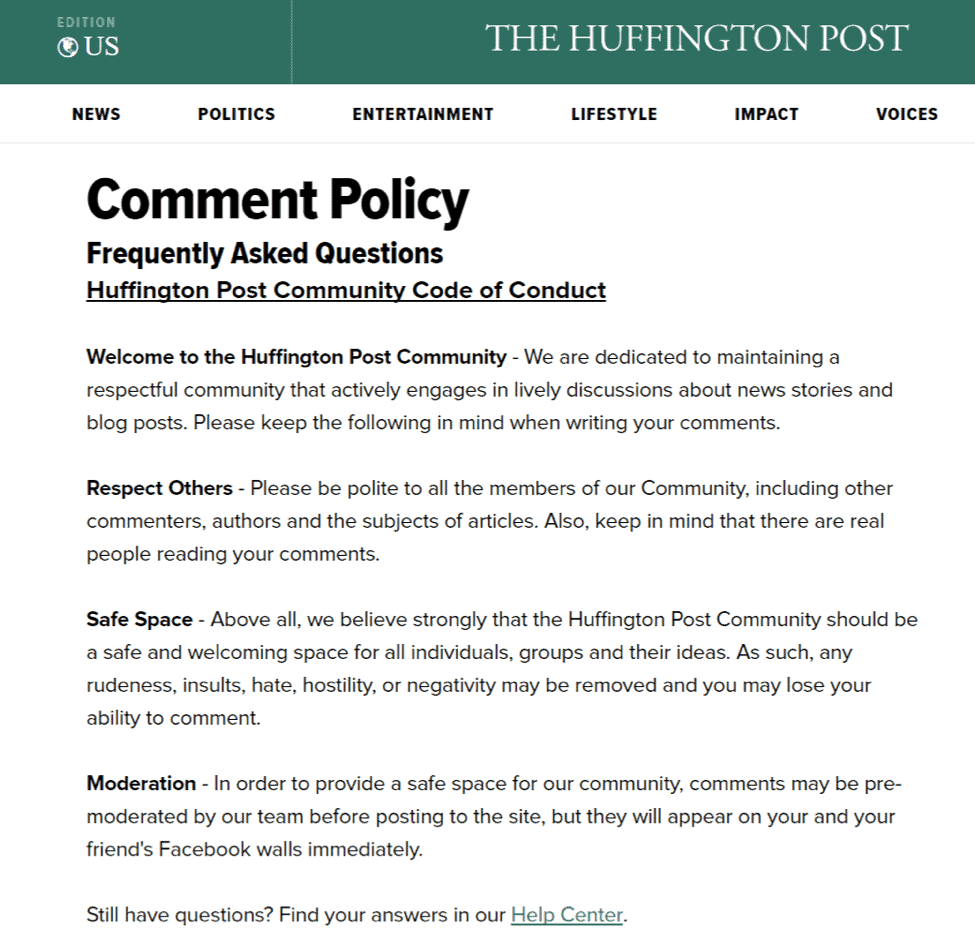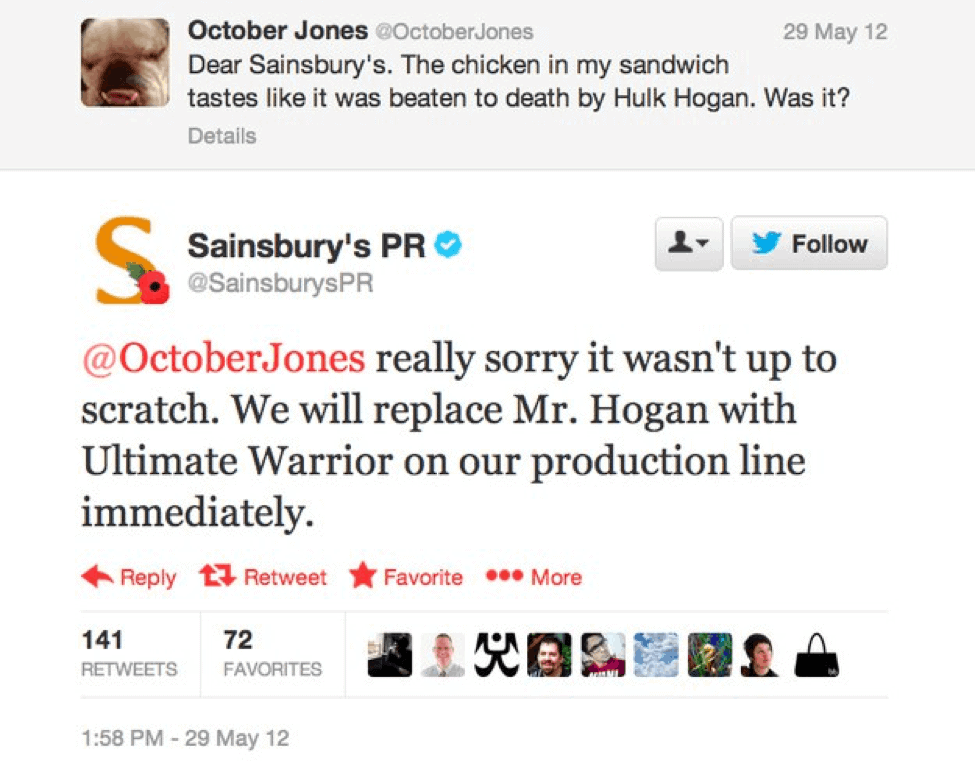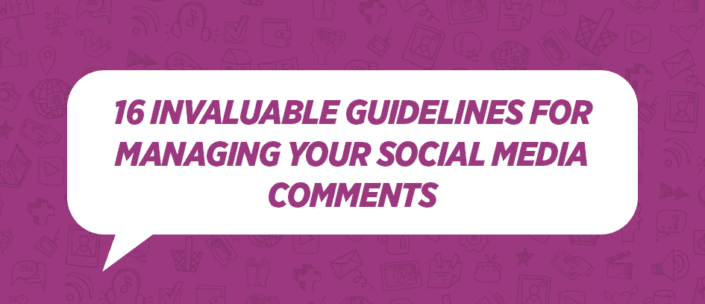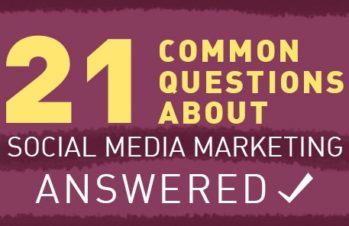Social media. It can really bring out the worst in people, can’t it?
From all-out trolls to plain old rude and offensive people, social media threads can become perilous places. That’s especially true for brands, which must tread an extremely fine line when it comes to comments.
Obviously, they can’t tolerate anything overtly offensive – but they also don’t want to be seen as exercising censorship over their followers.
You want your fans and followers to feel encouraged to engage with your posts.
You want them to feel confident that their views will be respected.
And you want them to know that personal attacks and inappropriate comments will not be allowed on your site.
How do you pull this off? How do you create an open, engaging forum for the exchange of opinions without allowing it to get out of hand?
The answer: A robust, clearly-defined comment management policy. These 16 guidelines will help you get there.
1. Establish a moderator. You need someone who’s committed to moderating your comments every day – not every few days, not once a week, but every day.
That way, you won’t log onto your social media page one day to find that a blatantly racist comment has been left to fester there for days, prompting a massive negative response from your more civilized followers and – who knows? – a boycott of your brand.
It’s happened before.
A moderator will prevent this from happening by checking your social media comments regularly throughout the day. How often will be determined by how many comments your brand generally receives.
2. Decide what constitutes harassing comments, and ban them.
One of the most important functions of a comment policy is to ensure that your followers feel safe while engaging with your brand on social media.
After all, that’s the whole point of having a social media presence in the first place: encouraging your customers to engage with you. If they get called names or otherwise harassed when they comment, they’re going to back off your site altogether.
Decide what you won’t tolerate, and put it plainly in writing. Here’s a pretty standard example from the Huffington Post.

3. On that note, don’t tolerate hate speech – ever.
Hate speech has no place – well, anywhere, but certainly not on your brand’s social media pages. Your customers deserve better than that.
If you have a commenter who repeatedly posts hateful speech or derogatory comments, you can either reach out to them privately to let them know they will no longer be allowed to post on your page, or you can simply remove them.
It’s important to know that social media networks have their own hate speech policies, as well as policies for banning certain people from commenting on your page. Make sure you follow the guidelines for whatever social media site you’re on.
4. Decide whether or not you’ll accept anonymous comments.
While social media sites don’t allow anonymous comments, your website or blog may. Whether you accept those is up to you.
Organizations that deal in sensitive areas – women’s shelters, for example, or groups that assist vulnerable populations – may need to enable anonymous comments for the safety of their customers.
If, however, commenters are using anonymity simply to post terrible things, there’s no point in allowing it.
5. Don’t allow spam.
People don’t like spam on their conversation feeds any more than they like it in their email. How do you decide if something is spam? Anything that is solely promotional, that links to a malicious website, or that are clearly irrelevant to the post at hand constitutes spam.
6. Delete inappropriate comments quickly.
As mentioned earlier, the last thing you want is to leave an offensive or inappropriate comment up on your brand’s page for days. Delete problematic comments immediately, or notify the moderator if you’re not the one responsible for handling the comments.
7. Consider pre-moderation.
If you have the resources, you may want to consider pre-moderating your site’s comments. This simply means that comments must be approved before they go live.
This can go a long way toward eliminating potentially inappropriate comments, but it also requires that someone go through your comments daily to approve or delete them. That can be a big time commitment if your commenters are fairly active.
8. Remember that constructive criticism is not inappropriate.
Maybe someone says something about your brand that you deeply disagree with. Maybe they post a strongly worded complaint on your page, right in front of everybody!
These sorts of comments may be uncomfortable to deal with, but they’re not inappropriate. Deleting them sends the message that you’re not willing to listen to your customers. Instead, the best tack is to engage respectfully with the commenter. Acknowledge their opinion or complaint, and then see if there’s anything you can do to help change their mind.
9. Establish timelines for responding to inquiries.
Jay Baer of Convince and Convert has found that 42 percent of customers who post complaints on social media expect a response from the company in as little as 60 minutes. 24 percent expect a response within 30 minutes.
And while the other 34 percent may be a bit more lenient, you can bet they’re not going to be pleased if you take a week to respond to their comment of a post. That’s why it’s so vital to respond to inquiries or complaints in a timely manner.
10. Use a social media management tool.
If you have multiple social media accounts, a social media management tool like Hootsuite can be of invaluable help.
These tools allow you to keep tabs on your profiles and comments from a single dashboard, rather than having to switch back and forth between different browser tabs. You can also set up email alerts that notify you each time there’s a mention of your brand.
11. Start conversations.
One way to get more high-quality comments is to start conversations. Pose an open-ended question, request images from your fans, ask for feedback on a new product – all of these are great ways to up your engagement.
You’ll get even more, of course, if you offer an incentive, like a discount or giveaway.
12. Identify your brand values, and ensure your comment policy and social media behavior uphold those values.
Knowing your brand values is an essential part of developing your brand’s voice on social. It’s also essential to managing your social media comments well.
These values should always be guiding you when you’re moderating comments from others, or posting your own.
13. Keep jargon and overly technical language out of your responses.
No one likes a show-off, so unless there’s truly no other way to say what you’re trying to say, don’t use jargon or tech-speak when responding to customer comments.
14. Be kind and polite.
Unless snark is part of your brand’s persona, your best bet is to always be kind and polite in your comments.
And if snark is part of your brand’s persona, you’d better be really, really good at it – like the UK grocery chain Sainsbury’s:

15. Make sure your commenting policy includes the consequences of violating one of your guidelines.
Commenters should know what will happen if they violate your commenting policy, whether that’s by posting spam or saying inappropriate things.
Don’t allow anyone to be totally blindsided by having their comment removed – that can end up backfiring on your brand in a big way.
16. Update your policy as needed.
As your brand evolves, you may find you need to update your commenting policy or your tactics for engaging with your followers. Don’t fall into the trap of doing something that’s no longer working, just because you’ve always done it that way.
Want to learn more about managing your social media presence? Read “12 Must-Have Skills for Every Digital Marketer.”







